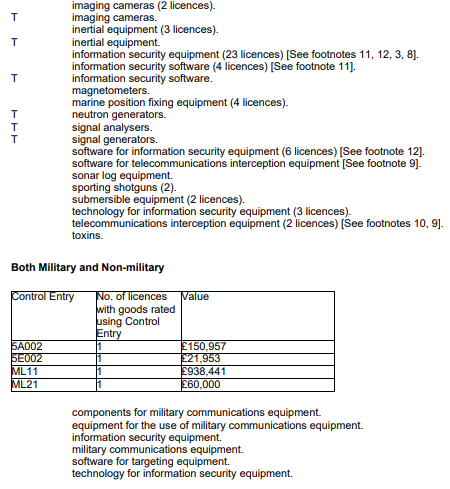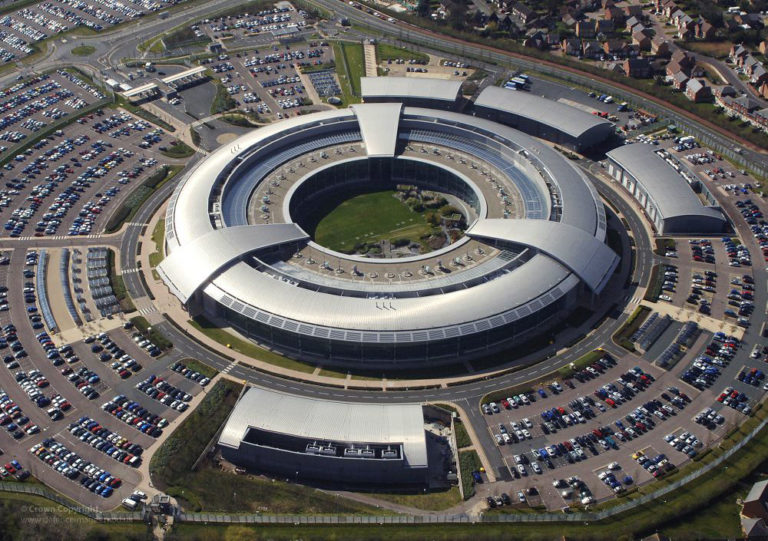In the past year, “telecommunications interception equipment,” or software & technology for it, has been exported to authoritarian regimes such as the UAE, Saudi Arabia, Oman and Qatar, report Matt Kennard and Mark Curtis.
By Matt Kennard and Mark Curtis
Declassified UK

 The British government is continuing to approve the export of hi-tech surveillance equipment and software of the type that is being used by states abusing human rights to monitor and repress dissent, new government figures show. The government’s exports of “telecommunications interception equipment” to repressive states are likely unlawful.
The British government is continuing to approve the export of hi-tech surveillance equipment and software of the type that is being used by states abusing human rights to monitor and repress dissent, new government figures show. The government’s exports of “telecommunications interception equipment” to repressive states are likely unlawful.
In the past 12 months, “telecommunications interception equipment,” or software and technology for such equipment, has been exported to 13 countries, including authoritarian regimes such as the United Arab Emirates (UAE), Saudi Arabia, Oman and Qatar.
Such technology enables security forces to monitor the private activities of groups or individuals, potentially enabling them to crack down on political opponents. Especially controversial are so-called IMSI-catchers, a sophisticated surveillance technology which can monitor phone conversations, text messages and private information stored on mobiles. IMSI-catchers are considered so sensitive that the British police have refused to confirm or deny whether it uses them.

U.K. Foreign Office Minister Alistair Burt with Dr. Anwar Gargash, the United Arab Emirates minister of state for foreign affairs at the 17th UK-UAE Taskforce in London, 28 Feb. 2018. (FCO/Flickr)
Recently released British government figures make clear that many of the approved exports are destined to “law enforcement” agencies of foreign governments.
The new data lends further weight to those calling on the British government to cease such exports in light of evidence they help fuel repression overseas and are illegal because they violate the government’s own export control guidelines.
Licenses for United Arab Emirates
The most recent data shows that from January to March this year, the UAE was granted three licenses for “communication and network surveillance” equipment and software, which the UK government notes are for “interception purpose.” The data also makes clear that this equipment is for “law enforcement agency end use.”
The UAE is one of the Gulf region’s most repressive states, where criticism of the government is “stifled by the prosecution and imprisonment of peaceful dissenters” and where space for civil society remains “nearly non-existent,” according to Amnesty International.
Last year, Ahmed Mansoor, the last human rights defender in the UAE publicly speaking out against human rights violations in the country, was sentenced to 10 years in prison for comments posted on social media. In a story that made headlines in 2016, Mansoor’s iPhone was hacked by the UAE government with software provided by an Israeli-based security company. Emirati authorities reportedly paid $1-million for the software, leading international media outlets to dub Mansoor “the million-dollar dissident.”
In 2016, the U.S. investigative website, The Intercept, published evidence of UAE government involvement in surveillance of the country’s citizens to track, locate and hack any person at any time. Programs were used to mount attacks on journalists and activists involving spyware sent through Twitter, spear-phishing emails and a malicious URL shortening service. These programs had been taking place since 2012, a source told The Intercept.
These revelations followed a report in The New York Times showing the UAE had attempted to install spyware on the computers of 1,100 dissidents and journalists. The spyware was found to have been sent by a company owned by a member of the Abu Dhabi royal family.
The UAE is a regular recipient of such surveillance equipment and technology from Britain. In 2017 and 2018, British exporters were given four licenses for the export of telecommunications interception equipment, components or software to the UAE.
More Exports to Gulf
British government figures show that similar licenses for telecommunications interception equipment were awarded for export to Saudi Arabia in 2018, also destined for use by its dictatorial regime.
Britain also approved licenses for similar equipment to Oman in 2017 and 2018, some of which was for “marketing and promotional purposes,” but software for telecommunications interception equipment intended for use by the regime was also exported, the data shows.
Another dictatorial Gulf state, Qatar, was awarded several licenses for such equipment during 2018, including for “government end use.”
Yet another repressive regime, Bahrain, was given approval to receive telecommunications interception equipment, alongside relevant software, from British companies in 2017 and 2018, although these are designated for “civilian/commercial end use.”
>>Please Donate to Consortium News’ Fall Fund Drive<<
Other approvals to Bahrain include 15 licenses for “information security equipment” and software. It is unclear what these goods are but some are for use by the government and thus raise long-held fears they will aid repression.
Bahrain has stepped up its repression of the political opposition since a significant uprising as part of the Arab Spring in 2011. Most human rights defenders and dissidents have been jailed, silenced or forced to move abroad in recent years, while public protests are officially banned in Manama, the capital.
Moreover, it has long been known that the Bahraini authorities target activists through surveillance technology. It is believed that Bahrain has been conducting communications surveillance on activists and opponents since at least the mid-2000s. In June 2019, the Bahraini authorities warned citizens and residents that even following anti-government social media accounts could result in legal action.
Surveillance of Bahraini activists by the regime has even occurred in the U.K. itself. In 2014, the NGO Privacy International brought a criminal complaint to the National Cyber Crime Unit of the U.K.’s National Crime Agency, calling for an investigation into the unlawful surveillance by Bahraini authorities of three Bahraini activists living in the U.K.
The Bahraini authorities infected the activists’ computers with the intrusive malware FinFisher, supplied by British company Gamma. The three activists – who had been granted asylum in the U.K. – had suffered from years of harassment and imprisonment by the regime, and were subject to torture at the hands of the Bahraini government.
Unlawful Exports?
The U.K.’s arms export guidelines state that the government will “not grant a licence if there is a clear risk that the items might be used for internal repression.” It defines the latter as including “torture and other cruel, inhuman and degrading treatment or punishment; summary or arbitrary executions; disappearances; arbitrary detentions; and other major violations of human rights.”
Reports by Amnesty International clearly document such abuses in the cases of Bahrain, UAE, Saudi Arabia and Oman. British approval of such exports is therefore prima facie illegal.
Since 2015, the U.K. has granted 283 export licenses for the export of surveillance technology, components or software, with the UAE, Oman, Saudi Arabia and Qatar all among the top 10 recipients. One estimate is that these exports have been worth more than £75-million.
One major company in this field is the U.K.’s largest arms exporter, BAE Systems, which sells surveillance technology to up to 50 countries, many of which are not subject to U.K. licensing requirements since they are sometimes exported from companies in the BAE group outside the U.K.
A BBC investigation in 2017 found that BAE Systems sells sophisticated surveillance technology across the Middle East to states including Saudi Arabia, the UAE, Qatar, Oman, Morocco and Algeria.
A BAE engineer was interviewed by Vice News this year and said, in relation to exports to the Gulf regimes, “Obviously we do work very closely with Cheltenham, who know everything we do.” Cheltenham, in southwest England, is the home of the U.K. government surveillance agency, GCHQ. BAE Systems Applied Intelligence, the cyber arm of the company, has offices in nearby Gloucester, where it says it “delivers information intelligence solutions to government and commercial customers.”

A page from the U.K. government’s latest report, dated July 2019, showing a snapshot of the controlled exports it has recently approved to the United Arab Emirates. Items include telecommunications interception equipment.
In July this year, it was revealed that the U.K. approved £1.9-million worth of telecommunications interception equipment for export to Hong Kong. This came just weeks before mass protests against the controversial proposed treaty with mainland China began in March.
The risk of such technology being used for repression is well-known to the government officials approving them.
In 2017, Computer Weekly obtained internal U.K. government correspondence showing how departments assess license applications. It confirmed the lack of any suitable risk analysis for such applications. The documents showed that, in 2012, the U.K. approved a license to export an IMSI-catcher to an agency in Macedonia. This technology was eventually used by the government for the illegal mass wiretapping of 20,000 activists, politicians and journalists.
Refusing Licenses
The British government data includes some licenses which have been rejected or revoked, confirming that officials are aware of the sensitive nature of these exports, and maybe the legal implications. In 2018, licenses for telecommunications interception equipment were refused to Bangladesh, Vietnam, Serbia and Nigeria.
Licenses for Bangladesh were refused or revoked between July and December 2018. This was at a time when the Bangladeshi government was engaged in a fierce response to protests against ongoing corruption in the country, with protesters and journalists being beaten and detained by security forces. It was also a period when the Bangladeshi security forces reportedly went on a shopping spree to purchase surveillance technology.
But no such licenses have recently been refused to Britain’s allies in the Gulf, whose regimes are undoubtedly worse in terms of their human rights records. Indeed, the government refuses very few license applications at all. Only 3.2 percent – or nine out of 284 applications for internet surveillance and telecommunications interception equipment – were refused in the four years from 2015-18 due to the risk of internal repression.
License Not Required
Neither do all surveillance exports even require a license from the government. While telecommunications interception equipment is subject to export controls if this is for mobile phones, such equipment for “lawful” interception of networks, rather than devices, is not. This would include technology for mass surveillance run by repressive regimes, similar to the NSA’s Prism program.
Another boom area for the industry is facial recognition technology, which if acquired by government agencies can enable them to identify individual protesters. This is also not included in the list of goods subject to U.K. export controls, and companies have told the authors that they freely export such technology with no such regulation.
Supporting Gulf Regimes
Given key British interests in the Gulf – where Britain has recently established new military base facilities in Bahrain and Oman – the government almost certainly views the export of surveillance equipment as another facet of its long-term support for the regimes in these states.
Promoting “internal security” has long been a feature of British policy in the Gulf, meaning to help keep ruling families in power. In its latest annual report, the Ministry of Defence states that U.K. military training programs, which are provided to nearly all the Middle East’s repressive regimes, “can offer very specific and immediate benefits to our international partners, for example… improving the capacity of partners to deal with internal security challenges.”
Britain has since 1964 had a training program for the Saudi National Guard, the body that protects the ruling royal family, and also trains the Royal Guard in Oman, Kuwait and Qatar.
In 2011, Britain helped the Bahraini regime put down popular protests threatening ongoing Sunni sectarian rule over the country. London fears regime change in the region upsetting its substantial military, trade and investment interests.
Protecting the Industry
Surveillance equipment used by government agencies is manufactured by hundreds of private corporations around the world. Most of these companies, however, are based in the major arms-exporting states with the biggest spy agencies.

GCHQ’s “doughnut” building in Cheltenham, west England. (U.K. Ministry of Defence, Wikimedia Commons)
The U.K. is at the heart of the industry, with over 100 companies providing equipment or services, the second-largest number in the world after the U.S. Many firms are based around GCHQ’s base in Cheltenham, which the government has worked to turn into a hub for cybersecurity firms. Northrop Grumman, BAE Systems Applied Intelligence and Raytheon are among the major military corporations which have operations in the area around Cheltenham, alongside a larger number of smaller firms.
But secrecy prevails on the recipients of the exported equipment.
Last month, one of the U.K.’s most senior national security reporters, Ian Cobain, was banned from attending the world’s largest arms fair, DSEI, in London, which is organized in part by the U.K. government.
Similarly, in March this year Labour MP Lloyd Russell-Moyle was also banned from attending a “security trade” fair in the U.K. to which the government had invited numerous of the world’s most repressive regimes. Moyle, who sits on parliament’s all-party arms control committee, was denied entry to the fair precisely at the time he was investigating the U.K.’s surveillance industry.
Increasing, Not Ending Exports
In September, the British government published a new Security Export Strategy, covering surveillance and cybersecurity equipment, among other areas. It highlighted that “the UK is a world-leader in the security sector” and the world’s fourth-largest exporter, adding that the government would “accelerate the continued year on year growth of security exports.”
Increasing British government backing for the spy tech industry flies in the face of rising international calls to ban exports of such technology.
In June this year the United Nations special rapporteur on freedom of opinion and expression, David Kaye, called for an immediate worldwide moratorium on the sale, transfer and use of surveillance technology until human rights-compliant regulatory frameworks are in place.
He noted, “Surveillance tools can interfere with human rights, from the right to privacy and freedom of expression to rights of association and assembly, religious belief, non-discrimination, and public participation. And yet they are not subject to any effective global or national control.”
Kaye’s call follows the European Parliament which in 2018 voted to tighten export controls restricting the supply of surveillance and encryption technology to regimes with poor human rights records. The new restrictions would apply to surveillance equipment including devices for intercepting mobile phones, hacking computers, circumventing passwords and identifying internet users.
Aside from U.K. and EU export controls, the world’s major accord governing international exports of arms and dual goods including surveillance technologies, known as the Wassenaar Arrangement, suffers from the problem of being voluntary rather than mandatory.
Calls to curb exports of surveillance technology are likely to be vigorously opposed by the British government, along with the private companies benefiting from the burgeoning infrastructure it has nurtured in this industry sector. But unless laws are tightened and enforced, the greatest price may continue to be paid by those challenging repressive systems in the Middle East and elsewhere.
Matt Kennard is an investigative journalist and co-founder of Declassified. He was previously director of the Centre for Investigative Journalism in London, and before that a reporter for The Financial Times in the U.S. and U.K. He is the author of two books, “Irregular Army” and “The Racket.”
Mark Curtis is a leading U.K. foreign policy analyst, journalist and the author of six books including “Web of Deceit: Britain’s Real Role in the World” and “Secret Affairs: Britain’s Collusion with Radical Islam.”
This article is from Daily Maverick.
Before commenting please read Robert Parry’s Comment Policy. Allegations unsupported by facts, gross or misleading factual errors and ad hominem attacks, and abusive or rude language toward other commenters or our writers will be removed. If your comment does not immediately appear, please be patient as it is manually reviewed. For security reasons, please refrain from inserting links in your comments.
>>Please Donate to Consortium News’ Fall Fund Drive<<

And what else is not news, been many years, since more than most people were born, fighting against US surveillance programs, 1950s till I gave up in 2010.
Why is it in our Eurocentric derived nations government we call other nations internal police states “Security Services” while in our nations the very same procedures are done by “INTELLIGENCE SERVICES”?
19 of US based soft and hardware developers all vie for US contracts for AI capable surveillance and monitoring contracts to be used upon US people.
So called “security” is not meant to provide security for individual citizens but for our interconnected Military, Intelligence themselves, Scientific- Educational and top 28% of its financial sector; all to control their flow of information from the populace at large.
Herd animals do not understand that they have no choices in life, they just go the direction the herd master points towards.
Content in own minds, and comfortable from drastic changes in their lives routine, passive in nature, even when in line to die at and for their herdmssters needs.
Thank you CN, Mr. Kennard and Mr. Curtis for this excellent article. Surveillance technology has indeed brought turnkey totalitarianism; democracy has been lost to the corruption of economic power.
Those who believe that such surveillance is necessary to crime-fighting should reflect that:
1. The greatest economic crimes are committed by those in power, and their financiers;
2. Crimes of large businesses, such as causing massive health risks for profit, are not investigated;
3. The FBI, HSI, and IRS refuse to investigate political racketeering even when given the evidence;
4. The FBI, HSI, and IRS refuse to investigate copyright racketeering even when given the evidence;
5. The FBI, HSI, and IRS refuse to investigate massive theft of public funds when given the evidence;
6. The FBI, HSI, and IRS refuse to investigate judicial corruption even when given the evidence;
7. The federal judiciary serve almost exclusively as extortionists of bribes to political parties;
8. The People of the United States cannot today enforce their constitutional rights at all;
9. Strong political activism is essential to restore democracy and has now been made impossible.
Those who believe that supporting foreign tyranny is necessary to national security should reflect that:
1. All US wars since WWII have damaged its security, and promoted tyranny rather than democracy;
2. The US has no dependency upon other nations for security;
3. The US has no dependency upon other nations for oil, which it can buy anywhere like anyone else;
4. The US is the most defensible nation in the world, and has not been invaded since 1812.
Those who believe that the US supports democracy and economic development should note that:
1. The US has since WWII overthrown many democracies, and established no successful democracy;
2. The US has since WWII directly killed 6 to 20 million people, and indirectly killed over 20 million;
3. The US has since WWII provided roughly one meal annually to the world’s poorest;
4. The US could have lifted the poorest half of the world from poverty since WWII;
5. If the US had done as it claims, it would have no enemy anywhere, and a far stronger economy.
Meanwhile every single phone call and text message in the US is monitored and recordedby the NSA. Every global satellite transmission is monitored and recorded (ref. ECHELON). Municipal police routinely use Stingrays (cell site simulators) to track people and communications.
Governments just don’t give a damn about the law anymore .They just do what they want ,legal or not and how would we as citizens of the so-called free world,the West ,bring them to task .We have the right of peaceful protest but if they know we are going to protest before hand , they can harass till the cows come home and they know we can’t do anything about it.
Thank you for pointing this out .
Hey, this is the UK where money has been #1 since the first king ripped everyone off.
This putting money before anything else is so extreme that many ‘leaders’ will risk the future of our entire planet so that they and the very rich can have far more than they will ever need.
hear hear.
The scandalous protection racket overseen by then British Prime Minister Tony Blair — he of the Iraq War lies — to close down the Serious Fraud Office (SFO) investigation of bribery between Saudi Arabia and the mega-arms producer BAE is still an open wound.
BAE allegedly had paid billions of dollars in bribes to the Saudis to secure arms deals. BAE denied any “wrongdoing.” In 2007, the Independent reported that the British High Court found that Tony Blair had “broken the law” by closing down the SFO investigation. Members of Parliament, including MP Nicholas Clegg called for a full investigation of Blair’s decision and everything related to the BAE Saudi arms deal. Tony Blair and his government were never investigated.
The BAE and UK arms sales to countries that butcher civilians with these weapons continues.
Thank you CNLive! for bringing Daniel Ellsburg and Katharine Gun on the program to tell the world, again, about the lies, trickery, and crimes of the US/UK in the run up to the 2003 invasion of Iraq.
Britain has gone from bad to worse; Britain is no longer the country where I was born, it is now a den of plutocrats and warmongers – the UK should abolish the Monarchy (that alone would save billions) as they, along with the British government, support repressive regimes such as Saudi Arabia, Israel and the USA.
The essential question’ Why only free, democratic countries are allowed to spy on their citizens and not authoritarian regimes ?
I believe spying on the population is the other side of allowing free expression. We have inured two generations of children to express themselves openly and demand whatever they want. We have disallowed their teachers from influencing or directing their social development and allowed children to attend their educational assessment, assuming the teacher will not be restricted in his opinions by their presence. These features of everyday life seem to be the natural consequences of our bestowing freedom on infants.